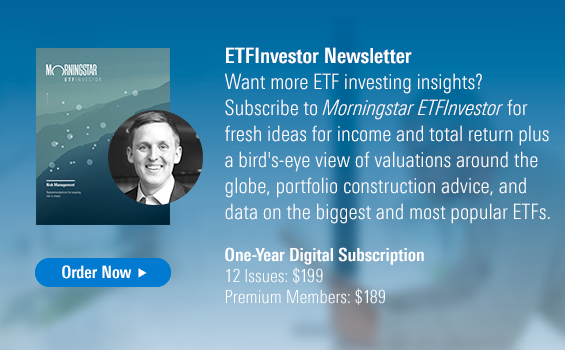One-Stop Shopping for Exposure to International Stocks
This iShares’ ETF has appeal, but investors don't have to go much further afield to find more-compelling options.
As a result of its broad reach, the fund owns approximately 1,200 large- and mid-cap stocks. The fund employs a market-capitalization-weighting approach, which promotes low turnover and skews the portfolio toward large multinational firms with global operations. Top holdings include names such as
Sector weightings here are comparable to the category average. Financial-services companies account for the fund’s largest sector allocation, representing nearly one fifth of the portfolio. Large banks such as
Since its inception in March 2008 through July 2016, the fund has trailed the average of its surviving category peers by 57 basis points, annualized. This fund’s performance relative to the category average is largely tied to the performance of its emerging-markets holdings. Emerging-markets companies make up approximately 16% of the portfolio, compared with the 7% category average. If it had included small-cap stocks, the fund’s performance would have been slightly better. Since the fund’s inception through July 2016, the fund’s benchmark (MSCI ACWI Ex USA) has lagged the MSCI ACWI Ex USA IMI, a broader index that also includes small-cap companies, by 40 basis points annualized, with similar volatility.
Like most of its peers, the fund does not hedge its currency risk. This can hurt performance when the U.S. dollar strengthens relative to currencies, like the euro, Japanese yen, and British pound, where the fund has significant exposure. Over the trailing five years through July 2016, over a fourth of the fund’s total volatility came from currency fluctuations.
Fundamental View The fund's market-capitalization-weighting approach, and large- and mid-cap orientation, skews the portfolio toward large multinational firms. These companies tend to be more profitable and less volatile than their smaller counterparts. But the countries where these firms are listed are not necessarily indicative of the economic exposure they provide. This broad market-cap-weighted portfolio promotes low turnover and effectively diversifies company-specific risk. The fund's top 10 holdings account for less than 10% of the portfolio, compared with the category average of over 25%. Yet, its weighting approach could tilt the portfolio toward names as they become larger and more expensive and away from firms as they become smaller and cheaper, which may have higher expected returns.
An above-average emerging-markets stake has hurt the fund’s performance in recent years and resulted in some notable differences in regional and country allocations. The developed-markets-focused MSCI EAFE Index has outperformed the MSCI Emerging Markets Index by 5.8% annualized over the trailing five-year period through July 2016. China has a disproportionately large total market capitalization among emerging markets. As a result, the fund has greater exposure to Chinese stocks than most of its peers. It also has less exposure to stocks listed in developed European countries, including the United Kingdom. Despite these differences, Japan represents the fund’s largest single-country exposure, accounting for nearly 20% of the portfolio, which is comparable to the category average.
The fund’s significant exposure to companies in the United Kingdom and Japan, both of which are dealing with economic headwinds, should be less of a concern for investors than it may appear. The U.K.’s recent decision to leave the European Union, along with Japan’s aging workforce and tremendous public debt, both have the potential to slow new investment and weaken demand. However, these risks should already be reflected in market prices. Additionally, a large proportion of holdings within these two countries are multinational firms with global operations that diversifies economic risk.
While economic risk should already be reflected in market prices, investors should be aware of their currency exposure if these economic events lead to changes in monetary policy. Central banks in the U.K., the eurozone, and Japan are all using aggressive monetary policies to keep interest rates low in an effort to simulate demand. If rates in those markets stay low, while rates rise in the United States, the U.S. dollar could strengthen, which would hurt the fund’s performance.
Portfolio Construction The fund employs a sampling approach to track the market-cap-weighted MSCI All Country World (ACWI) ex US Index. MSCI starts with all stocks listed in developed (excluding the United States) and emerging markets that pass certain liquidity screens. These stocks comprise the investable market universe. The index then sorts them on free-float adjusted market capitalization and targets those representing the largest 85% of the market by market capitalization, thereby eliminating small-cap constituents. The index applies additional screens for liquidity and foreign ownership eligibility to help ease index replication. This result is an index portfolio of approximately 1,900 constituents. The fund's managers then select a representative sample, resulting in a portfolio of approximately 1,200 stocks that mimic the investment profile of the index. This sampling approach helps reduce costs. Fees The fund charges an annual fee of 0.33%, which is cheap relative to the category, but there are comparable alternatives for less than half the price. Over the trailing three years through July 2016, the fund has trailed its benchmark by less than 1 basis point annualized. This is partially due to securities lending revenue, which helped offset the fund's expenses.
Alternatives
More risk-averse investors might consider

Disclosure: Morningstar, Inc.'s Investment Management division licenses indexes to financial institutions as the tracking indexes for investable products, such as exchange-traded funds, sponsored by the financial institution. The license fee for such use is paid by the sponsoring financial institution based mainly on the total assets of the investable product. Please click here for a list of investable products that track or have tracked a Morningstar index. Neither Morningstar, Inc. nor its investment management division markets, sells, or makes any representations regarding the advisability of investing in any investable product that tracks a Morningstar index.


/cloudfront-us-east-1.images.arcpublishing.com/morningstar/T2LGZCEHBZBJJPPKHO7Y4EEKSM.png)
/d10o6nnig0wrdw.cloudfront.net/04-18-2024/t_34ccafe52c7c46979f1073e515ef92d4_name_file_960x540_1600_v4_.jpg)
/d10o6nnig0wrdw.cloudfront.net/04-09-2024/t_e87d9a06e6904d6f97765a0784117913_name_file_960x540_1600_v4_.jpg)